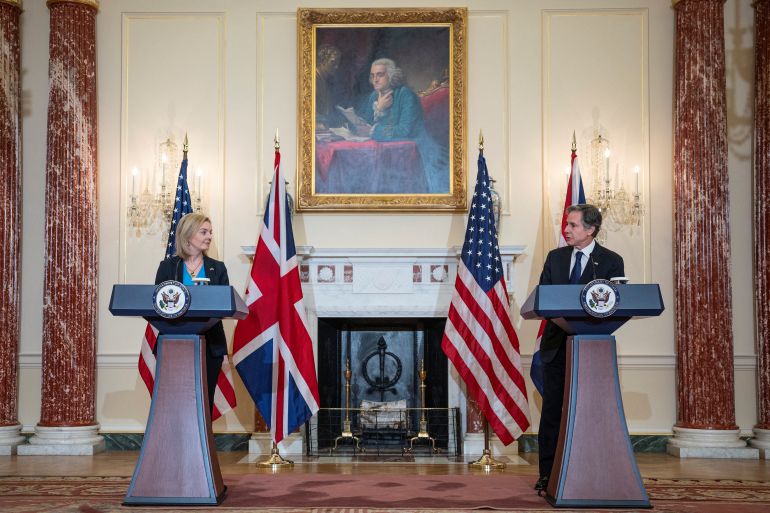US and UK rule out no-fly zone over Ukraine, again
Top US and UK diplomats pledge to bolster Ukrainian defences but say direct confrontation with Russia would prolong war.

The United States and the United Kingdom have reiterated their opposition to establishing a no-fly zone over Ukraine, saying they want to avoid a direct military confrontation with Russia.
During a joint news conference in Washington alongside his British counterpart on Wednesday, US Secretary of State Antony Blinken said the Biden administration’s aim is to end the conflict, not expand it.
Keep reading
list of 3 itemsRussia facing setbacks in Ukraine, US intelligence officials say
Infographic: Which countries buy the most Russian weapons?
“Introducing, in our case, American servicemembers in Ukraine … or American pilots into Ukrainian airspace – whether on a full or on a limited basis – would almost certainly lead to direct conflict between the United States, between NATO and Russia,” Blinken told reporters.
“And that would expand the conflict; it would prolong it; it would make it much … deadlier than it already is. And that would be neither in the interest of our countries, nor in the interest of Ukraine.”
The top US diplomat’s remarks come amid repeated calls from Ukrainian President Volodymyr Zelenskyy for NATO to install a no-fly zone over the country amid Russia’s attacks.
On Wednesday, UK Foreign Secretary Elizabeth Truss also rejected the push to establish a no-fly zone over Ukraine, even a limited one to protect humanitarian corridors.
“The reality is that setting up a no-fly zone would lead to a direct confrontation between NATO and Russia,” UK’s Truss told reporters.
“And that is not what we are looking at. What we are looking at is making sure that the Ukrainians are able to defend their own country with the best possible selection of anti-tank weapons and anti-air defence systems.”
Earlier in the day, the UK said it was exploring plans to supply air defence systems to Ukraine – a move that Truss confirmed during the news conference. She said the British government would “help the Ukrainians with the Starstreak air defence systems that we will be supplying”.
Washington also has said it will continue to provide humanitarian and military aid to Kyiv.
Late on Tuesday, however, US officials turned down an offer by Poland to send its Russian-made MiG-29 fighter jets to Ukraine through an American airbase in Germany.
The Pentagon said in a statement that the prospect of fighter jets “departing from a US/NATO base in Germany to fly into airspace that is contested with Russia over Ukraine raises serious concerns for the entire NATO alliance”.
Later on Wednesday, Pentagon spokesperson John Kirby said US Secretary of Defense Lloyd Austin informed his Polish counterpart that Washington does not back Warsaw’s plans to transfer its Russian-made MiG-29 jets to Ukraine.
“He stressed that we do not support the transfer of additional fighter aircraft to the Ukrainian air force at this time, and therefore have no desire to see them in our custody, either,” Kirby told reporters.
He said the effectiveness of Russia’s “significant” air force has already been limited by Ukraine’s air defences.
“Polish generosity is clearly on display for the whole world to see,” Kirby said. “But at this time, we believe that provision of additional fighter aircraft provides little increased capabilities at high risk.”
Moreover, he said, transferring the jets to Ukraine would risk escalation with Russia.
Blinken recently returned from a trip to Europe, where he visited several NATO countries to assure them that the US would come to their aid if they are attacked. NATO has a collective defence treaty that states an attack on any member is considered an attack on the entire alliance. Ukraine is not a member of NATO.
On Wednesday, Blinken told reporters that Poland’s fighter jet proposal highlighted the “complexities … when it comes to providing security assistance”. He added, “We have to make sure that we’re doing it in the right way.”
Russia launched an all-out invasion of Ukraine on February 24 after a months-long standoff that saw Moscow amass troops near the Ukrainian borders as it demanded an end to NATO expansion into former Soviet republics.
The war has forced more than two million people to flee Ukraine, according to the United Nations, and devastated areas across the country. Major cities, including the capital Kyiv, have faced Russian bombardment and siege.
The US and its allies were quick to impose sweeping sanctions on the Russian economy as well as financial penalties on Russian President Vladimir Putin and elites in his inner circle.
Testifying in Congress on Tuesday, top US intelligence officials underscored that Russian forces are facing setbacks in their military campaign amid fierce Ukrainian resistance, predicting even more intense fighting in the weeks ahead.
On Tuesday, US President Joe Biden announced a ban on Russian oil and gas imports, prompting Russia to warn of “catastrophic consequences for the global market”. Unlike many countries in Europe, the US – a major oil producer – does not rely on Russian fuel for its energy needs.
On Wednesday, Truss called for further sanctions against Russia, urging more countries to join in the effort to isolate Moscow economically.
“We must double down on our sanctions. That includes a full SWIFT ban, and the G7 ending its use of Russian oil and gas,” Truss said.
“The United States and the United Kingdom this week announced our plans to stop importing Russian oil, and the EU have announced their plans to reduce their dependency, too. We want to encourage a wider group of countries to get on board with our sanctions effort.”